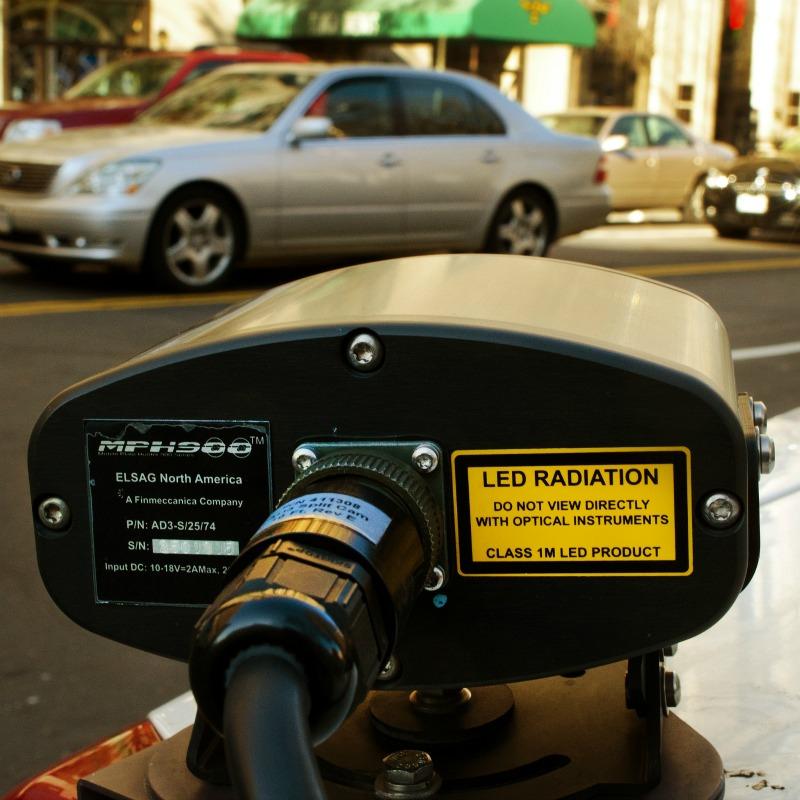BOB GARFIELD: So we move from the most secret of secrets to what may be too much information. Increasingly, law enforcement agencies all over the country are using license plate readers, car-mounted infrared cameras that capture the license plate numbers and the date, time and location information of every car they pass in order to catch violators in real time. But even if you obey the law, your whereabouts at any moment in time could well be being logged by these cameras.
In August of this year, I spoke with Eric Roper of the Minneapolis Star Tribune, who filed a couple of Freedom of Information Act requests for license plate reader information. It turns out never mind the cops, anyone and everyone has access.
ERIC ROPER: What we found is that 4.9 million plates have been scanned in Minneapolis just in 2012. The vast amount of the data is on people who have not violated any laws but are just driving around the city. You can make a request of what happens to be now public information, so the information on my car, which I requested, we received a number of data points that the police had kept over the course of a year, but also the information of the Mayor of Minneapolis, his information was also public. There isn’t a state law, and this is the case in most states, governing how we keep this data, how long, so it’s left up to local law enforcement agencies, who can use it as they see fit.
BOB GARFIELD: Now, the principal use of this is to find people with outstanding warrants and stolen car reports, and so forth. To your knowledge, have the police used the data to investigate an individual who they are interested in for perhaps something more significant than traffic fines?
ERIC ROPER: The police have said that they do use what’s stored in that database to help them with investigations. An example that they provided to me was they were looking for a suspect, and looked at his license plate reader data and found that he was parked at a certain location, repeatedly. That gave them a place to begin in trying to find him.
BOB GARFIELD: Hence, the impulse to keep the data for a year, instead of two days.
ERIC ROPER: Exactly.
BOB GARFIELD: On this program, we are almost reflexively in favor of sunshine, that whatever the government’s collecting the public should have access to. But it frankly terrifies me that as a private citizen I have access to essentially the tracking records of other private citizens.
ERIC ROPER: Well, that’s what’s so ironic about this program, is that it’s not something that people generally know about,but here in Minnesota that data is public. And now, each state will depend on records requests there to find out whether the State Open Records Laws preclude any of that. But you find that there’s almost too much transparency when it comes to license plate data on a program that we haven’t known much about, up until now.
BOB GARFIELD: I mentioned the availability of this data to third parties. Now, that might mean a reporter interested in where the Mayor’s been, and it could be someone whose business [LAUGHS] has an interest in where your car is at any given time. You know of one such case.
ERIC ROPER: There was one car dealership that sells cars to people with bad credit who - those people had stopped paying for those cars, and now it was trying to repossess those cars. So some repo men were looking for their cars –
[BOB LAUGHS]
- and figured this was a perfect opportunity to do that.
BOB GARFIELD: But what’s troubling is there might be people even more sinister than repo men, people operating outside the law, who might have an interest in my driving patterns.
ERIC ROPER: Right, and one of the most prominent voices on this who is a chief information officer for our Public Defender Service, he brought up the examples of ex-spouses and stalkers and people who are looking to burglarize people. I mean, he really feels like there are some major public safety implications here.
BOB GARFIELD: So which of On the Media’s hobbyhorses should rise to the fore here? [LAUGHS] Should it be our sense that personal privacy is sacrosanct and that nobody should surrender it by accident and especially to the government? Or should it be that government transparency should be the overriding social good and, therefore, if we surrender a little privacy in the bargain it’s no big deal? Or, or is there some middle ground here?
ERIC ROPER: I think the first step here with regard to transparency is having a public discussion at legislatures, at city councils, at the federal government level perhaps, about this technology. And so, that at least allows people to understand what’s out there and how it’s being used. From there, decisions can be made about whether it’s private or public and how it can be shared. You know, I think transparency starts with having a public discussion. And so, that basically seems to be just beginning.
BOB GARFIELD: Eric, many thanks.
ERIC ROPER: Thank you very much, Bob.
BOB GARFIELD: Eric Roper is a reporter for the Minneapolis Star Tribune.

